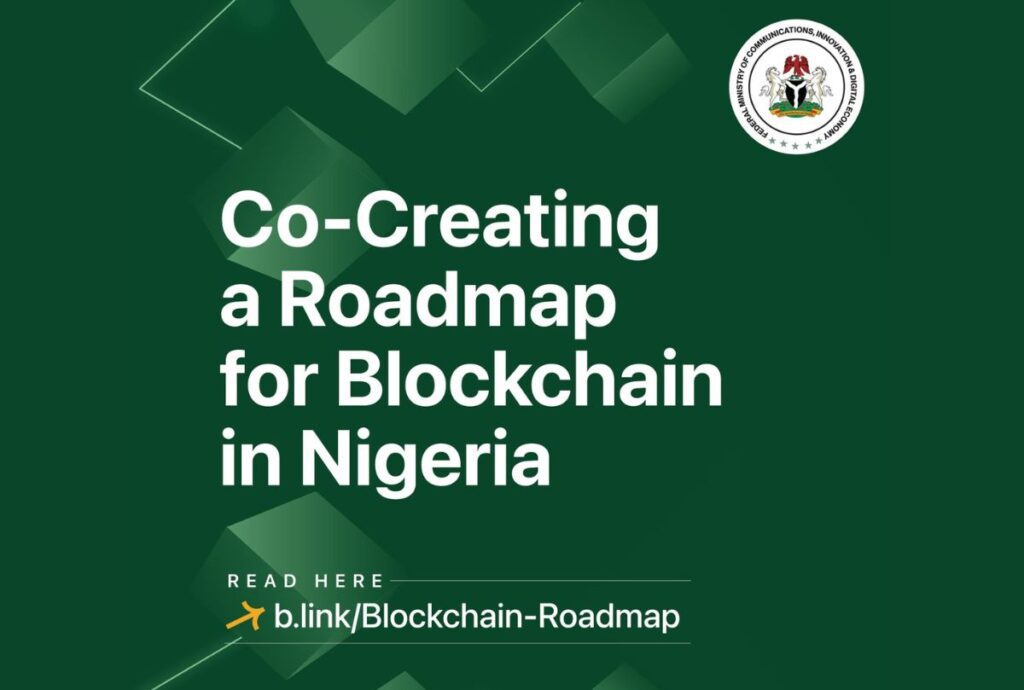In 2023, Nigeria introduced a blockchain policy, which was barely implemented; no document was ditched in favor of a new Nigeria Blockchain policy.
Let’s dive in and see, if any, what makes this new National digital innovation plan different and whether this new government blockchain adoption roadmap can do what its predecessor clearly failed at.
In Brief
-
Nigeria blockchain policy pivots on four pillars—tech training, clear crypto regulations, robust infrastructure, and startup funding—to deliver digital transformation.
-
Education targets aim for 3 million trained professionals by 2027, while broadband and fiber rollouts will connect 90 % of the population.
-
New regulatory clarity, incentives, and the “Nigeria Stack” public infrastructure framework are designed to attract investment and spur inclusive growth.
Nigeria’s New Blockchain Policy: A Strategic Move Towards a Digital Economy
Nigeria stands at the top of Africa’s Web3 Food chain, with recent stats on stablecoin transactions and wallet adoption proving once again why Nigeria leads Africa’s digital economy.
In a classic case of deja vu, Nigeria’s government has leapfrogged yet again to overhaul its nation’s blockchain adoption post-report.
Spearheaded by Bosun Rijani, Minister of Communication and Digital Economy, the updated frameworks seek, yet again, to tap into the country’s lucrative digital economy and overhaul its performance, cementing its reign as Africa’s Web3 Leader.
Now, improvements are bound to occur with the 2025 revisions, building upon the lessons for the 2023 National Blockchain Policy, which still sits in its proposal phase.
Including AI-driven blockchain research, the report addresses various key areas like transparency, efficiency, and security.
CHECK OUT: Nigeria Stablecoin Transactions Boom: A Positive Financial Shift
Understanding Nigeria’s Blockchain Policy and Its Focus Areas
With guidance from Bosun Tijani, the Nigeria blockchain policy will prioritize a structure inclusive and forward-looking framework for adoptions.
The Whitepaper, highlights a collaboration with the National Information Technology Development Agency to hopefully avoid the failings of the 2023 policy.
The key objective of the Nigeria blockchain policy is to increase financial inclusion by leveraging local talents to establish new frontiers of decentralized finance.
In addition, adoption is a highlight with the documents showcasing various use cases of blockchain beyond finance, i.e. secure and verifiable digital entities to improve sliver delivery.
This falls in line with incorporating the technology within government services providing more efficiency, a critical factor to improve Nigeria’s economic growth.

Crypto regulations are still a key component in any policy. While the CBN has had a somewhat rocky relationship with digital assets, it recently changed its heart.
The CBN has publicly announced discussions on more balanced oversights, preventing cases like launching and sudden disappearing acts from exchanges(CBEX) without choking innovation.
Unfortunately, skepticism still exists among thought leaders like Njoku Emmanuel, Lazerpay CEO, who doubt the viability of the policy.
The CEO highlights that Nigeria has more pressing issues to address, like the infrastructure gaps within the country that would drive a nail into its new blockchain policy, like its predecessor.
Nigeria’s Government Blockchain Adoption Roadmap
The policy aligns with its government blockchain adoption roadmap, which features 4 core pillars.
The first is Knowledge of Blockchain technology. The policy highlights the government’s plan to establish innovation hubs throughout the country, supporting the growth of local talent and tech startups.
The policy estimates a target of 3 million early-to-mid-carrer tech training by 2027, with the government retaining 1,5 million for local projects and exporting 1.5 million to international organizations.
This initiative targets the top 25% globally, leveraging AI, UAVE, IoT, Robotics, Blockchain, and Additive Manufacturing, attaining a 705 general digi-literate populous by 2027 and 75% by 2030.
This will be accomplished via educational programs, infrastructure, and universal resources.
The second pillar revolves around crypto regulations and policy. Nigeria will attract more investments by forging regulatory clarity and incentives while safeguarding IP and democratizing digital benefits.
This pillar includes various initiatives like the regions:
- National Broadplan Plan(ensure 70% internet penetration averaging 25Mbps in urban areas and 10 Mbps in rural)
- The Digital Public Infrastructure Policy to deliver “Nigeria Stack” by 2025
- Telecoms Policy Review (lift sector GDP share to 22% by 2027; halve unconnected rural population to <20%)
- Blockchain, AI & Startup Acts—each with specific targets (e.g., 50,000 AI jobs by 2030; double startups’ access to incentives and procurement)
- Digital Economy Bill (enacted by 2024; 50% paperless public processes by 2026)
- Open Data & Digital Literacy Frameworks (digitize 60% government data; 40% women participation in training)
The third pillar focuses more on infrastructure to build a digital backbone to connect citizens, businesses, and governments.
This includes a Fibre-optic rollout targeting 95,000km(75% achievement by 2027), an estimated 90% broadband penetration by 2027, and the OneGove digital access platform launch.
In addition, postal and satellite revamps were made by modernizing 50% of NIPOST locations via PPPs and elevating NigComSat’s capability to 75%.
The fourth and final pillar is to energize startups and channel capital to critical sectors. This segment estimates startup funding to reach $5 billion by 2027 and increase the domiciliation of local tech firms from <1% to 25%.
CHECK OUT:Is Nigeria Web3 Ecosystem a Goldmine? $3B Stablecoin Data Reveals
Nigeria’s Role in the Global Blockchain Ecosystem
One of the policy’s most prominent aspects is its emphasis on how blockchain improves financial inclusion. The region’s DeFi industry has rapidly improved, with the region hosting popular crypto remittance services.
Nigeria’s blockchain policy promotes local talents into its economy, improving services beyond finance. The National digital innovation plans align with Nigeria’s vision to achieve a fully integrated digital economy, and leveraging Web3 is a sure way to achieve this.
While the country faces challenges such as inadequate infrastructure and inconsistent electricity supply, the government’s commitment to building a digital economy is unwavering.
Nigeria is setting the stage for a more equitable and tech-driven future through the government’s adoption roadmap and strategic investments in blockchain research.

